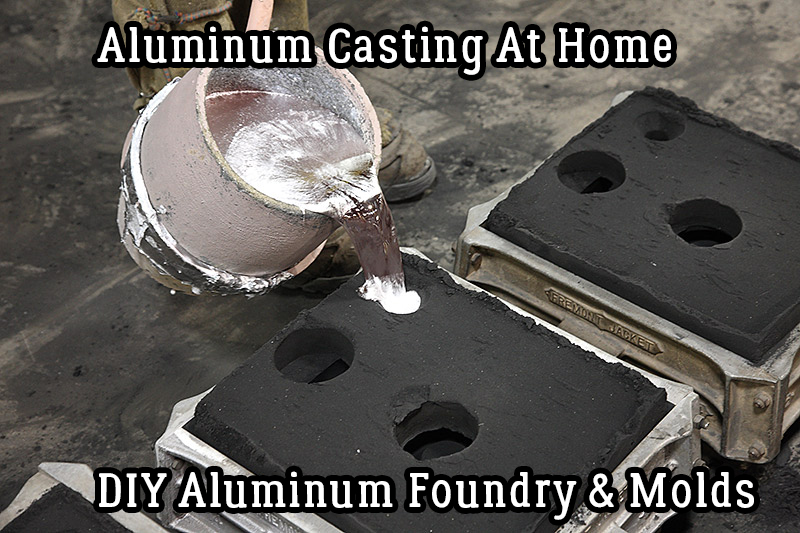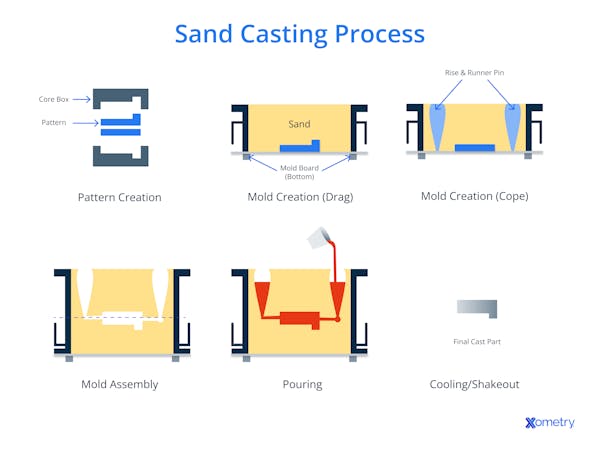Aluminum Foundry Wisconsin is valued for dependability in casting
Wiki Article
Recognizing the Advantages and Innovations in the Aluminum Foundry Sector
The Aluminum Foundry market plays an important duty in modern manufacturing. Its light-weight properties especially boost gas performance, specifically in automotive and aerospace fields. In enhancement, Aluminum's resistance to deterioration assurances durability in different applications. As the industry evolves, innovations such as sophisticated recycling and additive production are improving production approaches. Checking out these advancements reveals not just the advantages however also the difficulties ahead for Aluminum shops in a swiftly changing market.The Lightweight Advantage of Aluminum
Aluminum's lightweight nature offers substantial benefits throughout numerous industries, particularly in production and transport. Its low thickness permits the manufacturing of elements that are much easier to set up and manage, resulting in lowered labor expenses and enhanced effectiveness. In the auto market, lighter vehicles add to improved gas economy and lower emissions, straightening with global sustainability goals. Likewise, in aerospace, using Aluminum lowers the total weight of aircraft, which is important for enhancing performance and lowering functional expenses.Additionally, Aluminum's light-weight homes assist in innovative designs that were previously impossible with much heavier products. This adaptability enables makers to develop complicated shapes and frameworks while preserving architectural honesty. Overall, the light-weight advantage of Aluminum not just enhances product performance however additionally drives developments in innovation and layout, making it a favored product in different applications.
Rust Resistance and Durability
The Aluminum Foundry sector is renowned for creating materials with premium rust resistance, making them excellent for various applications. This home, integrated with boosted structural stability, contributes to the durable performance advantages that Aluminum parts offer. As a result, markets progressively count on Aluminum to meet demanding environmental problems without compromising top quality.
Superior Corrosion Resistance
While different steels deal with significant obstacles from ecological variables, Aluminum stands out for its remarkable rust resistance, making it a favored selection in numerous applications. This residential property is mostly because of a natural oxide layer that develops on the Aluminum surface area, providing a barrier versus dampness and destructive agents. Unlike other metals that may corrosion or weaken gradually, Aluminum preserves its honesty also in rough settings, such as commercial settings or seaside areas. Additionally, its light-weight nature incorporated with corrosion resistance makes it suitable for applications in aerospace, automobile, and marine industries. Generally, Aluminum's exceptional resilience not just enhances product long life however additionally lowers maintenance expenses, offering an engaging benefit for makers and customers alike.Improved Architectural Stability
Developers and designers increasingly recognize the importance of boosted architectural integrity in contemporary applications, where both deterioration resistance and longevity are crucial. Aluminum alloys, known for their light-weight residential or commercial properties, likewise display phenomenal resistance to deterioration, making them ideal for rough environments. The ingenious methods utilized in the Aluminum Foundry sector contribute considerably to generating elements with improved resilience. Advanced casting processes and alloy make-ups are tailored to satisfy specific performance requirements, guaranteeing that structures can withstand extreme problems without jeopardizing honesty. Surface area treatments and layers enhance the lifespan of Aluminum products, additionally alleviating degeneration over time. This concentrate on enhanced structural honesty not only prolongs the usability of materials yet additionally reduces upkeep expenses, solidifying Aluminum's setting as a material of choice in numerous industries.Long-lasting Performance Perks
Lasting performance in Aluminum components is mostly attributed to their remarkable corrosion resistance and toughness. Unlike many metals, Aluminum naturally creates a safety oxide layer, which prevents corrosion and degeneration in numerous environments, including industrial and aquatic setups. This integral residential or commercial property considerably extends the life expectancy of Aluminum items, decreasing upkeep and substitute costs. Additionally, the light-weight nature of Aluminum improves its applicability across sectors without endangering strength. The product's resistance to wear and tear also adds to its reliability in demanding applications, making it an excellent option for vehicle, aerospace, and construction sectors. As markets increasingly prioritize sustainability and long life, Aluminum's efficiency advantages align with modern-day design requirements, solidifying its duty in ingenious production procedures.Ecological Influence and Sustainability
 As the Aluminum Foundry sector progresses, it increasingly prioritizes environmental effect and sustainability, recognizing the demand for responsible practices when faced with climate modification. Efforts to reduce waste and power usage are at the center, with several factories embracing reusing initiatives to reclaim Aluminum scrap. This not just lowers raw product usage yet additionally notably reduces power expenditure, as recycled Aluminum requires only a fraction of the power contrasted to main production.
As the Aluminum Foundry sector progresses, it increasingly prioritizes environmental effect and sustainability, recognizing the demand for responsible practices when faced with climate modification. Efforts to reduce waste and power usage are at the center, with several factories embracing reusing initiatives to reclaim Aluminum scrap. This not just lowers raw product usage yet additionally notably reduces power expenditure, as recycled Aluminum requires only a fraction of the power contrasted to main production.Furthermore, developments in exhausts manage modern technologies are being applied to decrease air contaminants, lining up procedures with stricter ecological regulations. Factories are likewise exploring different energy sources, such as solar and wind, to power their centers sustainably. By cultivating cooperation with stakeholders, the market aims to establish innovative remedies that enhance ecological stewardship. Collectively, these campaigns highlight a commitment to reducing the Aluminum Foundry's carbon footprint while promoting a circular economy within the manufacturing sector.
Advanced Manufacturing Techniques
 Reinventing manufacturing processes, the Aluminum Foundry market is increasingly integrating advanced manufacturing techniques to improve efficiency and accuracy. Techniques such as computer system numerical control (CNC) machining and additive production have become vital parts in enhancing production process. CNC machining enables high-precision part manufacture, considerably lowering product waste and manufacturing time. Additive production opens up brand-new methods for complex geometries and light-weight layouts that were formerly difficult to achieve.
Reinventing manufacturing processes, the Aluminum Foundry market is increasingly integrating advanced manufacturing techniques to improve efficiency and accuracy. Techniques such as computer system numerical control (CNC) machining and additive production have become vital parts in enhancing production process. CNC machining enables high-precision part manufacture, considerably lowering product waste and manufacturing time. Additive production opens up brand-new methods for complex geometries and light-weight layouts that were formerly difficult to achieve.Additionally, the release of automation and robotics in Aluminum shops improves operations, minimizes human error, and improves employee security. These innovations facilitate a more responsive manufacturing atmosphere, making it possible for producers to adapt swiftly to market demands. The integration of sophisticated simulation software application better enhances the design and screening stages, leading to exceptional product high quality. Jointly, these techniques not only improve functional efficiency yet additionally foster advancement, positioning the Aluminum Foundry industry at the center of contemporary production.
Advancements in Recycling Procedures
The Aluminum Foundry sector is not just advancing in manufacturing techniques but is additionally making substantial strides in reusing procedures. Technologies are look at this now arising to improve the efficiency of recycling methods, decreasing power usage and enhancing sustainability. Advanced sorting technologies, such as automatic optical sorting, enable the identification and separation of Aluminum from various other materials with high precision. This causes a better of recycled Aluminum, which is crucial for keeping the honesty of the last items.
Moreover, closed-loop recycling systems are being executed, allowing suppliers to recycle Aluminum scrap within their very own manufacturing processes. This decreases waste and advertises a round economic situation. Furthermore, research study right into new recycling techniques, such as hydrometallurgical procedures, offers the capacity for recouping Aluminum from complicated waste streams. These technologies not just add to decreasing the carbon footprint of the Aluminum Foundry sector but additionally reinforce its economic viability in an increasingly ecologically mindful market.
Applications Throughout Numerous Industries
Many markets are progressively identifying the flexibility and benefits of Aluminum Foundry products, leading to prevalent applications throughout industries such as vehicle, aerospace, building and construction, and customer items. In the vehicle market, Aluminum castings contribute to light-weight automobile layouts, enhancing gas performance and efficiency. Aerospace makers utilize Aluminum components for their strength-to-weight ratio, essential for airplane structures and components.In building, Aluminum is favored for its durability and resistance to rust, making it suitable for home window frames, roofing, and architectural assistances. Consumer items additionally benefit from Aluminum Foundry products, as seen in cookware, electronic devices, and product packaging, where lightweight and recyclable materials are important.
The flexibility of Aluminum next Foundry strategies permits specific specs and detailed designs, dealing with the varied demands of these industries. Therefore, Aluminum Foundry products are coming to be essential to modern-day production processes throughout various industries.
Future Patterns in Aluminum Foundries
As markets remain to evolve, Aluminum factories are poised to embrace several vital patterns that promise to boost effectiveness and sustainability. One popular fad is the enhancing fostering of electronic innovations, including automation and expert system, which improve operations and boost quality control. On top of that, the push in the direction of sustainable techniques is leading foundries to spend in reusing modern technologies, considerably reducing waste and energy intake. An additional emerging trend is using innovative alloys and products, satisfying the expanding demand for resilient and light-weight components across different fields (Aluminum Foundry). Additionally, the integration of additive manufacturing strategies is anticipated to revolutionize part design, offering personalization and reducing lead times
An additional emerging trend is using innovative alloys and products, satisfying the expanding demand for resilient and light-weight components across different fields (Aluminum Foundry). Additionally, the integration of additive manufacturing strategies is anticipated to revolutionize part design, offering personalization and reducing lead timesCollaboration with research study establishments is likewise anticipated to drive advancement, as foundries seek to develop brand-new procedures and products. Aluminum Foundry. Collectively, these fads indicate a transformative future for the Aluminum Foundry industry, straightening with more comprehensive objectives of sustainability and effectiveness
Often Asked Questions
What Are the Normal Costs Linked With Aluminum Foundry Manufacturing?
The typical costs related to Aluminum Foundry production consist of raw products, labor, power, tools maintenance, and overhead costs. These variables collectively influence the overall economic investment needed for efficient Aluminum spreading procedures.Exactly How Does Aluminum Contrast to Other Steels in Stamina?
Aluminum, while lighter than lots of steels, displays remarkable strength-to-weight proportions. Contrasted to steel, Aluminum is less solid yet provides excellent deterioration resistance, making it a beneficial choice in applications Look At This where weight and resilience are vital.What Precaution Remain In Location in Aluminum Foundries?
Security actions in Aluminum foundries commonly include obligatory individual protective devices, air flow systems to regulate fumes, regular equipment upkeep, training programs for staff members, and adherence to rigorous security guidelines to decrease risks related to liquified metal handling.Just How Is Quality Control Managed in Aluminum Spreading Processes?
Quality assurance in Aluminum casting processes includes strenuous examinations at numerous phases, consisting of resources examination, process surveillance, and last product screening. Techniques such as statistical procedure control and non-destructive screening assurance adherence to sector criteria.What Certifications Are Very Important for Aluminum Foundry Suppliers?
The significance of accreditations for Aluminum Foundry vendors includes ISO 9001 for high quality monitoring, ISO 14001 for ecological management, and industry-specific criteria like ASTM and SAE, guaranteeing compliance, safety and security, and dependability in making procedures.The Aluminum Foundry sector plays a vital role in modern manufacturing. The Aluminum Foundry industry is renowned for producing products with superior corrosion resistance, making them excellent for different applications. Reinventing production processes, the Aluminum Foundry sector is significantly incorporating sophisticated manufacturing strategies to improve performance and precision. The Aluminum Foundry market is not only advancing in making methods yet is additionally making substantial strides in recycling procedures. As industries continue to develop, Aluminum foundries are positioned to welcome several vital fads that assure to improve efficiency and sustainability.
Report this wiki page